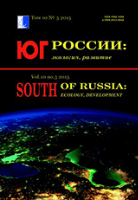
South of Russia-Ecology Development
Scope & Guideline
Advancing ecological insights for a sustainable South of Russia.
Introduction
Highly-cited Topics
- Environmental Safety and Economic Security:
Research focusing on the intersection of environmental safety and economic stability is increasingly relevant, especially as governments prioritize sustainability in their economic policies. This theme attracts citations due to its broad applicability across disciplines, including ecology, economics, and public policy. - Climate Change and Pathogen Dynamics:
Studies exploring the relationship between climate change and the dynamics of infectious diseases, particularly zoonotic viruses, are gaining traction. The increasing prevalence of pandemics drives interest in this area, leading to higher citation counts as researchers seek to understand and mitigate these risks. - Natural Products and Antiviral Research:
Investigations into the inhibitory effects of natural compounds on viruses like SARS-CoV-2 are highly sought after. This area attracts citations due to the urgency of finding effective treatments and the growing interest in alternative medicine and phytotherapy. - Ecological Interactions and Biodiversity:
Research on ecological interactions, such as predator-prey dynamics and species interactions, is critical for understanding biodiversity. This area garners citations as it informs conservation efforts and ecosystem management strategies. - Sustainable Development and Community Engagement:
Studies assessing sustainable development practices, particularly in local communities, are increasingly relevant in the context of global sustainability goals. This research area attracts citations due to its implications for policy-making and community resilience. - Bioindication and Environmental Assessment:
Research utilizing bioindication methods for assessing environmental health is essential for effective conservation strategies. This area is likely to attract citations as it provides practical insights for environmental monitoring and management. - Agricultural Sustainability and Disease Control:
Investigations into biological control methods for agricultural pests and diseases are critical for sustainable farming practices. This area garners citations as it addresses food security and environmental concerns, appealing to a wide range of stakeholders.
Similar Journals

Chemistry-Didactics-Ecology-Metrology
Transforming Education with Ecological PerspectivesChemistry-Didactics-Ecology-Metrology is a pioneering academic journal dedicated to the interdisciplinary exploration of chemistry, education, ecology, and metrology, published by SCIENDO. With an ISSN of 1640-9019 and an E-ISSN of 2084-4506, this journal serves as a cornerstone for researchers and professionals looking to enhance their understanding of chemistry's applications in environmental sciences and education. The journal's rigorous peer-reviewed articles span across a variety of relevant fields, ensuring high-quality content that reflects current trends and advancements. In the 2023 metrics, the journal is categorized in the Q3 quartile for Ecology, Education, and Environmental Engineering, with placements in the Q4 quartile for Environmental Chemistry, showcasing its significant contribution to these domains. Despite its relatively young history since its first publication in 2019, Chemistry-Didactics-Ecology-Metrology is already establishing itself as a valuable resource within the scholarly community. This open-access platform provides scholarly articles that foster a robust dialogue among academia and practitioners alike, promoting sustainable practices through education and innovative research in environmental chemistry.
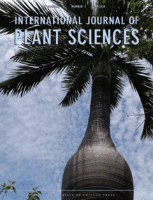
INTERNATIONAL JOURNAL OF PLANT SCIENCES
Connecting researchers with groundbreaking plant studies.The INTERNATIONAL JOURNAL OF PLANT SCIENCES, published by UNIV CHICAGO PRESS, is a leading journal dedicated to advancing knowledge in the fields of plant sciences and ecology. With an ISSN of 1058-5893 and an E-ISSN of 1537-5315, this journal has been a prominent platform for groundbreaking research since its establishment, featuring works from 1983 to present. It holds an impressive Q2 ranking in both Ecology, Evolution, Behavior and Systematics and Plant Science, reflecting its reputable standing within the academic community. The journal is well-regarded for its rigorous peer-review process and commitment to high-quality publication standards, making it a favored choice for researchers, students, and professionals eager to engage with the latest findings and innovative methodologies in plant research. While it does not currently operate under an Open Access model, the journal provides ample access options for institutions and individuals keen to explore its curated content. By presenting diverse studies that blend theoretical and practical insights, the INTERNATIONAL JOURNAL OF PLANT SCIENCES plays a critical role in fostering interdisciplinary dialogue and advancing the frontiers of plant science research.
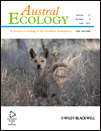
AUSTRAL ECOLOGY
Advancing ecological insights from the Southern Hemisphere.AUSTRAL ECOLOGY, published by WILEY, is a key journal in the field of ecology, with a focus on ecological research from the Southern Hemisphere and beyond. With an ISSN of 1442-9985 and an E-ISSN of 1442-9993, this journal serves as a vital platform for the dissemination of significant findings related to ecology, evolution, behavior, and systematics. Currently holding a commendable Q2 ranking in both Ecology and Ecology, Evolution, Behavior and Systematics categories as of 2023, AUSTRAL ECOLOGY is recognized for its rigorous peer-review process and impactful research contributions, as evident from its Scopus rankings in the 56th percentile for both Agricultural & Biological Sciences and Environmental Science. Researchers, professionals, and students engaged in ecological studies can benefit from the journal's open access options, enabling wider accessibility to critical ecological insights and advancements in the field. Established in 1981, with an evolving legacy through its converged years from 1996 to 2024, AUSTRAL ECOLOGY remains committed to advancing ecological knowledge and fostering a deeper understanding of ecological dynamics in our ever-changing environment.

Vestnik Tomskogo Gosudarstvennogo Universiteta-Biologiya
Advancing Biological Insights for a Sustainable FutureVestnik Tomskogo Gosudarstvennogo Universiteta-Biologiya is a prominent peer-reviewed journal dedicated to advancing knowledge in the fields of Agricultural and Biological Sciences, Biochemistry, and Environmental Science, published by TOMSKIJ GOSUDARSTVENNYI UNIV in the Russian Federation. With an ISSN of 1998-8591 and an E-ISSN of 2311-2077, this journal serves as a vital platform for researchers to disseminate findings that encompass diverse biological disciplines. Although currently categorized in the fourth quartile across several fields, including Agricultural and Biological Sciences (Q4) and Environmental Science (Q4), the journal is committed to improving its academic impact and visibility. Its publication spectrum includes significant contributions from both local and international scholars, fostering a rich exchange of ideas and research methodologies. Access to the journal’s content is unrestricted, providing valuable resources for students, professionals, and researchers alike. As the journal converges its focus from 2018 to 2024, it aims to enhance its academic stature while contributing rigorously to contemporary biological research.
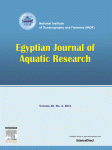
Egyptian Journal of Aquatic Research
Fostering collaboration in the realm of aquatic sciences.Welcome to the Egyptian Journal of Aquatic Research, a premier peer-reviewed academic journal published by ELSEVIER, dedicated to advancing the field of aquatic sciences. With a robust impact factor and recognition as a Q1 journal in key categories such as Aquatic Science and Ecology, this open access journal has established itself as a vital platform for disseminating high-quality research since its inception in 2012. The journal aims to provide comprehensive coverage of topics including ecology, evolutionary biology, and water science, making it a crucial resource for researchers, professionals, and students engaged in these dynamic fields. With Scopus rankings placing it in the top echelons of various categories, the Egyptian Journal of Aquatic Research fosters innovation, collaboration, and knowledge dissemination on a global scale, making it an indispensable asset for anyone invested in understanding and preserving aquatic systems.
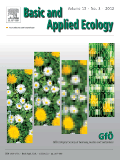
BASIC AND APPLIED ECOLOGY
Exploring the intricate connections of nature and science.BASIC AND APPLIED ECOLOGY, published by Elsevier GmbH in Germany, stands out as a premier journal in the field of ecology, evolution, behavior, and systematics. With its ISSN 1439-1791 and E-ISSN 1618-0089, the journal enjoys a distinguished reputation, evidenced by its classification in the Q1 category for Ecology in 2023 and impressively ranking #89 out of 721 in this domain according to Scopus. Since its inception in 2000, it has served as a vital platform for disseminating high-quality research that bridges theoretical insights and practical applications in ecology. Researchers, professionals, and students alike can look forward to the latest findings that not only foster a deeper understanding of ecological processes but also inform sustainable practices crucial for our environment. As the journal continues its journey through to 2024, it remains committed to advancing ecological knowledge and supporting innovative research in an ever-evolving field.
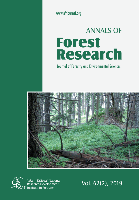
Annals of Forest Research
Connecting scholars to foster environmental stewardship.Annals of Forest Research is a peer-reviewed journal dedicated to advancing knowledge in the fields of forestry, ecology, and plant sciences. Published by EDITURA SILVICA in Romania, this journal has been an open access publication since 2008, providing a platform for researchers to share their insights and findings with a global audience. The journal operates under a rigorous selection process, reflected in its positioning within the Q2 category in Forestry and Q3 in both Ecology and Plant Science as of 2023. With Scopus rankings indicating a solid percentile among its peers, Annals of Forest Research continues to play a vital role in disseminating innovative research and fostering scholarly dialogue. Researchers, professionals, and students are encouraged to explore its diverse range of articles, which address both foundational and contemporary issues in forest management and environmental sustainability, contributing to the sustainable use and preservation of forest ecosystems.

Ecosistemas
Championing open access to the latest in ecological science.Ecosistemas is a prominent Open Access journal published by the ASOCIACION ESPANOLA ECOLOGIA TERRESTRE, specializing in the field of ecology. Since its inception in 2001, it has dedicated itself to advancing ecological knowledge and research, fostering an inclusive platform for the dissemination of cutting-edge studies that span ecological interactions, sustainability, and biodiversity. The journal, based in Spain, has established its reputation with notable rankings such as Q3 in the field of Ecology and Q4 in Ecology, Evolution, Behavior, and Systematics, reflecting its commitment to quality research. With a Scopus Ranks position placing it in the 40th and 37th percentiles for its categories, Ecosistemas is integral to the academic community, serving researchers, professionals, and students alike. It provides a vital resource for those seeking to understand ecological dynamics and environmental challenges, facilitating open access to important findings and discussions that shape the future of our ecosystems.
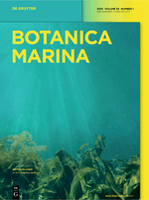
BOTANICA MARINA
Exploring the depths of marine botany and ecosystems.BOTANICA MARINA, published by Walter de Gruyter GmbH, is a prestigious journal dedicated to the fields of aquatic science, ecology, and plant science, with an ISSN of 0006-8055 and an E-ISSN of 1437-4323. Since its inception in 1959, this journal has served as a vital platform for disseminating high-quality research, contributing significantly to the understanding of marine botany and ecosystems. Recognized for its impact, BOTANICA MARINA ranks in the Q2 quartile across multiple categories, reflecting its robust standing in the academic community. With its Scopus rankings placing it in the upper percentiles for Ecology, Evolution, Behavior and Systematics, as well as Aquatic Science and Plant Science, this journal is essential for researchers and professionals seeking to advance their understanding of marine environments. Although it currently does not offer Open Access options, access to its articles can lead to critical insights and developments in the study of marine biodiversity. The journal's commitment to quality and relevance makes it an invaluable resource for students and seasoned researchers alike.

Journal of Geographical Sciences
Unveiling Insights in Earth Sciences Since 2001.Welcome to the Journal of Geographical Sciences, a premier publication in the field of Earth and Planetary Sciences that has consistently demonstrated its impact and relevance since its inception in 2001. Published by SCIENCE PRESS, this esteemed journal is recognized for its rigorous peer-review process and high-quality research, achieving an impressive Q1 ranking in the 2023 category of Earth and Planetary Sciences (miscellaneous). With the latest Scopus ranking placing it at Rank #13 of 159, putting it in the top 8% of its field, the journal serves as a vital platform for disseminating significant findings and innovative methodologies in geography, environmental studies, and related disciplines. Although not an open-access journal, it offers exceptional visibility through its publication standards and accessibility in academic databases. Based in Beijing, China, the Journal of Geographical Sciences continues to pave the way for scholarly discourse and collaborative research, appealing to researchers, practitioners, and students dedicated to advancing our understanding of geographical phenomena.